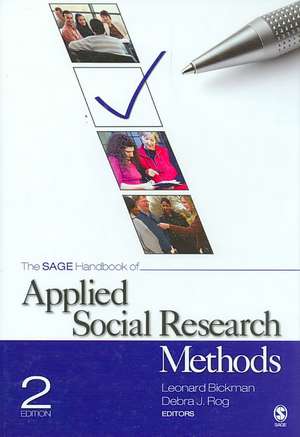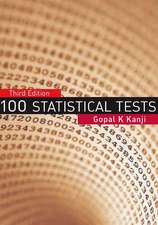The SAGE Handbook of Applied Social Research Methods
Editat de Leonard Bickman, Debra J. Rogen Limba Engleză Hardback – 22 oct 2008
- twenty core chapters written by research experts that cover major methods and data analysis issues across the social and behavioral sciences, education, and management;
- emphasis on applying research techniques, particularly in "real-world" settings in which there are various data, money, time, and political constraints;
- new chapters on mixed methods, qualitative comparative analysis, concept mapping, and internet data collection;
- a newly developed section that serves as a guide for students who are navigating through the book and attempting to translate the chapters into action;
- a new Instructor's Resources CD, with relevant journal articles, test questions, and exercises to aid the instructor in developing appropriate course materials.
Preț: 1080.38 lei
Preț vechi: 1187.22 lei
-9% Nou
Puncte Express: 1621
Preț estimativ în valută:
206.73€ • 216.29$ • 171.73£
206.73€ • 216.29$ • 171.73£
Carte disponibilă
Livrare economică 13-27 martie
Livrare express 26 februarie-04 martie pentru 60.75 lei
Preluare comenzi: 021 569.72.76
Specificații
ISBN-13: 9781412950312
ISBN-10: 1412950317
Pagini: 680
Dimensiuni: 178 x 254 x 40 mm
Greutate: 1.32 kg
Ediția:Second Edition
Editura: SAGE Publications
Colecția Sage Publications, Inc
Locul publicării:Thousand Oaks, United States
ISBN-10: 1412950317
Pagini: 680
Dimensiuni: 178 x 254 x 40 mm
Greutate: 1.32 kg
Ediția:Second Edition
Editura: SAGE Publications
Colecția Sage Publications, Inc
Locul publicării:Thousand Oaks, United States
Recenzii
“Updating their one-volume handbook (1st ed., 1998) describing approaches, design, and data collecting methods that are useful in conducting social research, editors Bickman and Rog in this second edition include chapters on the increasing use of the Internet, computer-assisted research methods, and the use of “mixed methods,” combining qualitative and quantitative methods. Over 30 authors from academic institutions, government agencies, and the private sector, representing various social science disciplines, contributed to this resource for research methods that can be applied in social science disciplines such as education, geography, political science, and sociology.”
"Rarely is a text able to succinctly and effectively appeal to a wide variety of practitioners from all areas of social science while maintaining a practical and easily accessible tone. However, this is exactly what I found when I read the second edition of The Sage Handbook of Applied Social Research Methods."
"Rarely is a text able to succinctly and effectively appeal to a wide variety of practitioners from all areas of social science while maintaining a practical and easily accessible tone. However, this is exactly what I found when I read the second edition of The Sage Handbook of Applied Social Research Methods."
Cuprins
INTRODUCTION
WHY A HANDBOOK OF APPLIED SOCIAL RESEARCH? - Leonard Bickman & Debra J. Rog
PART I. APPROACHES TO APPLIED RESEARCH
1. Applied Research Design - Leonard Bickman & Debra J. Rog
2. Design Sensitivity: Statistical Power for Applied Experimental Research - Mark W. Lipsey & Sean M. Hurley
3. Practical Sampling - Gary T. Henry
4. Planning Ethically Responsible Research - Joan E. Sieber
PART II. APPLIED RESEARCH DESIGNS
5. Randomized Controlled Trials for Evaluation and Planning - Robert F. Boruch, David Weisburd, Herbert M.Turner III, Allison Karpyn & Julia Littell
6. Quasi-experimentation - Melvin A. Mark & Charles S. Reichardt
7. Designing a Qualitative Study - Joseph A. Maxwell
8. How to Do Better Case Studies (with Illustrations from 20 Exemplary Case Studies) - Robert K. Yin
9. Integrating Qualitative and Quantitative Approaches to Research - Abbas Tashakkori & Charles Teddlie
10. Organizational Diagnosis - Michael I. Harrison
11. Research Synthesis and Meta-analysis - Harris M. Cooper, Erika A. Patall & James J. Lindsay
PART III. PRACTICAL DATA COLLECTION
12. Design and Evaluation of Survey Questions - Floyd J. Fowler Jr. & Carol Cosenza
13. Internet Survey Methods - Samuel J. Best & Chase H. Harrison
14. Concept Mapping for Applied Social Research - Mary Kane & William Trochim
15. Mail Surveys - Thomas W. Mangione & Janet H. Van Ness
16. Methods for Sampling and Interviewing in Telephone Surveys - Paul J. Lavrakas
17. Ethnography - David M. Fetterman
18. Group Depth Interviews: Focus Group Research - David W. Stewart, Prem N. Shamdasani & Dennis W. Rook
Applied Research Design - Leonard Bickman, Debra Rog
Designing a Qualitative Study - Joseph Maxwell
Practical Sampling - Gary Henry
Planning Ethically Responsible Research - Joan Sieber
Randomized Controlled Experiements for Evaluation - Robert Boruch
Quasi-Experimentation - Melvin Mark, Charles Reichardt
Abridged Version of Case Study Research: Design and Method - Robert Yin
Research Synthesis and Meta-Analysis - Harris Cooper, Erika Patall, James Lindsay
Design and Evaluation of Survey Questions - Floyd Fowler, Carol Cosenza
Organizational Diagnosis and Assessment - Michael Harrison
Mail Surveys - Thomas Mangione
Methods for Sampling and Interviewing in Telephone Surveys - Paul Lavrakas
Ethnography - David Fetterman
Focus Group Research: Exploration andDiscovery - David Stewart, Prem Shamdasani, Dennis Rook
Concept Mapping - Mary Kane, William Trochim
Internet Data Collection - Samuel Best
Mixed Methods - Abbas Tashakkori, Charles Teddlie
Comparative Analysis - Benoit Rihoux, Charles Ragin
WHY A HANDBOOK OF APPLIED SOCIAL RESEARCH? - Leonard Bickman & Debra J. Rog
PART I. APPROACHES TO APPLIED RESEARCH
1. Applied Research Design - Leonard Bickman & Debra J. Rog
2. Design Sensitivity: Statistical Power for Applied Experimental Research - Mark W. Lipsey & Sean M. Hurley
3. Practical Sampling - Gary T. Henry
4. Planning Ethically Responsible Research - Joan E. Sieber
PART II. APPLIED RESEARCH DESIGNS
5. Randomized Controlled Trials for Evaluation and Planning - Robert F. Boruch, David Weisburd, Herbert M.Turner III, Allison Karpyn & Julia Littell
6. Quasi-experimentation - Melvin A. Mark & Charles S. Reichardt
7. Designing a Qualitative Study - Joseph A. Maxwell
8. How to Do Better Case Studies (with Illustrations from 20 Exemplary Case Studies) - Robert K. Yin
9. Integrating Qualitative and Quantitative Approaches to Research - Abbas Tashakkori & Charles Teddlie
10. Organizational Diagnosis - Michael I. Harrison
11. Research Synthesis and Meta-analysis - Harris M. Cooper, Erika A. Patall & James J. Lindsay
PART III. PRACTICAL DATA COLLECTION
12. Design and Evaluation of Survey Questions - Floyd J. Fowler Jr. & Carol Cosenza
13. Internet Survey Methods - Samuel J. Best & Chase H. Harrison
14. Concept Mapping for Applied Social Research - Mary Kane & William Trochim
15. Mail Surveys - Thomas W. Mangione & Janet H. Van Ness
16. Methods for Sampling and Interviewing in Telephone Surveys - Paul J. Lavrakas
17. Ethnography - David M. Fetterman
18. Group Depth Interviews: Focus Group Research - David W. Stewart, Prem N. Shamdasani & Dennis W. Rook
Applied Research Design - Leonard Bickman, Debra Rog
Designing a Qualitative Study - Joseph Maxwell
Practical Sampling - Gary Henry
Planning Ethically Responsible Research - Joan Sieber
Randomized Controlled Experiements for Evaluation - Robert Boruch
Quasi-Experimentation - Melvin Mark, Charles Reichardt
Abridged Version of Case Study Research: Design and Method - Robert Yin
Research Synthesis and Meta-Analysis - Harris Cooper, Erika Patall, James Lindsay
Design and Evaluation of Survey Questions - Floyd Fowler, Carol Cosenza
Organizational Diagnosis and Assessment - Michael Harrison
Mail Surveys - Thomas Mangione
Methods for Sampling and Interviewing in Telephone Surveys - Paul Lavrakas
Ethnography - David Fetterman
Focus Group Research: Exploration andDiscovery - David Stewart, Prem Shamdasani, Dennis Rook
Concept Mapping - Mary Kane, William Trochim
Internet Data Collection - Samuel Best
Mixed Methods - Abbas Tashakkori, Charles Teddlie
Comparative Analysis - Benoit Rihoux, Charles Ragin
Descriere
This Handbook addresses the methodology of social science research and the appropriate use of different methods.







